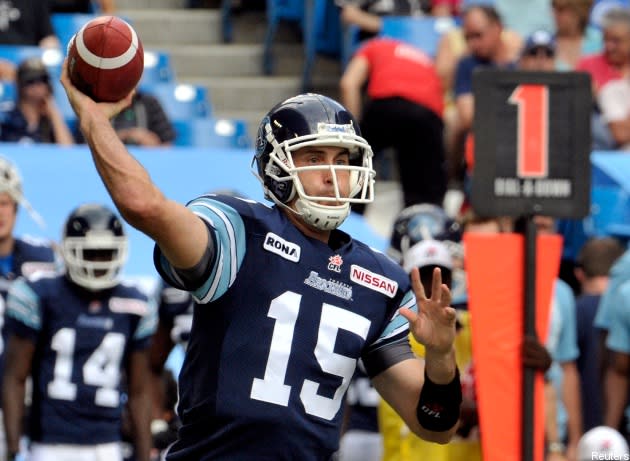Can Argos convert field position into TDs?
Depending on the statistics you look at, the Toronto Argonauts may have a solid offence or a horrible one. The team sits seventh in the league in points per game (22.9), but they had put up the fourth-most total yards of offence (373.3 per game) heading into this week's action, the third-most passing yards per game (296.1), the third-highest average gain per pass (8.4 yards), the most passes completed (171) and the highest passing completion percentage (69.0 per cent). They're also getting great starting field position from Chad Owens, who has 1,095 combined return yards on the year. Thus, this is an offence that can move the ball, but they can't punch it into the end zone; their 12 touchdowns on the year are the second-lowest in the league, and one of the main reasons the Argonauts have as many points as they do is that kicker Swayze Waters has been effective, making 12 of his 14 field goal attempts (85.7 per cent) thus far. The question is if the Boatmen will be able to convert their field position into touchdowns Monday (7:30 p.m. Eastern, TSN/NBC Sports Network) against Edmonton.
The Eskimos won't be an easy opponent in that regard. They're 4-3 despite an offence that's barely scoring more than Toronto (23.4 points per game) and isn't moving the ball anywhere as consistently (Edmonton's 303.1 yards of total offence per game put them last in the league heading into this week's action, 48.9 yards behind second-worst Winnipeg), and a large portion of the Eskimos' success in spite of that offence is thanks to their outstanding defence. The Edmonton defence has allowed just 19.6 points per game (second-best in the league behind B.C.), and they've been making big plays: they had the most interceptions (11) and were tied for the second-most quarterback sacks (16) heading into this week. They had also allowed the second-fewest passing touchdowns (eight) and the third-fewest touchdowns (14). Oddly enough, teams can move the ball on the Eskimos; before this week's games, they were giving up the second-highest passing yards per game (316.0), the second-highest rushing yards per game (102.1) and the third-highest net offensive yards per game (398.1). Thus, their defence seems likely to present the sort of bending-but-not-breaking strategy that's frustrated the Argonauts thus far.
However, while Toronto's struggles turning field position into touchdowns are problematic, they're a good issue to have in the grand scheme of things. They're certainly easier to fix than the Eskimos' inability to move the ball on offence. The Argonauts are doing a lot of things right, especially through the air; Ricky Ray's stats on the year are terrific (296.1 passing yards per game with a 69.0 per cent completion mark) if you overlook his nine-to-seven touchdown-to-interception ratio. They also proved effective on the ground last week against Calgary even without Cory Boyd (who will be on the opposite side Monday), with Chad Kackert collecting 94 rushing yards on 14 carries (6.7 yards per carry); it's an open question if Kackert can do that consistently, but he was very good against the Stampeders. All the Argonauts need to do is to translate the success they're finding on the rest of the field into success in the red zone and start adding to their touchdown totals. It's not particularly easy to do that, but at least their offence is capable in other categories. We'll see if they can start putting up some points Monday.

 Yahoo Sports
Yahoo Sports 


